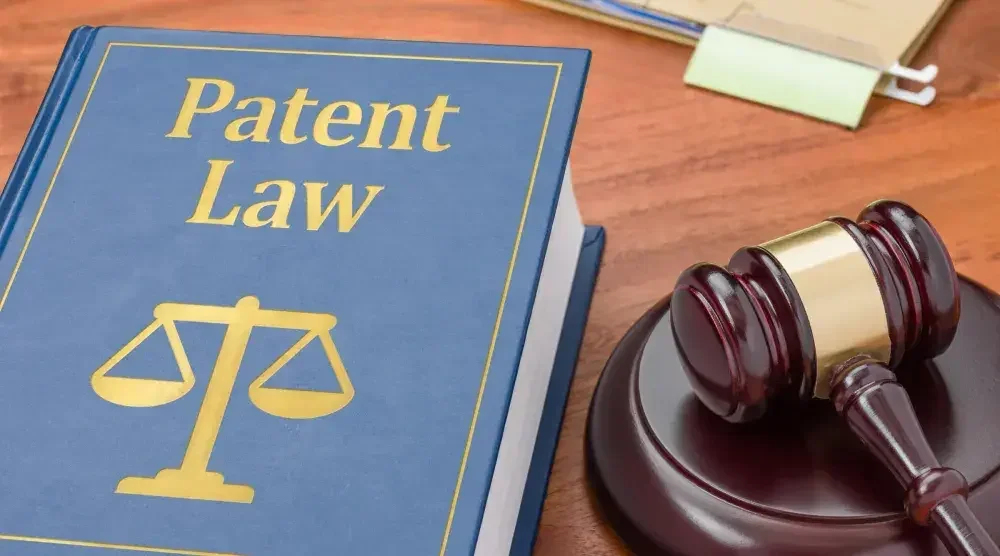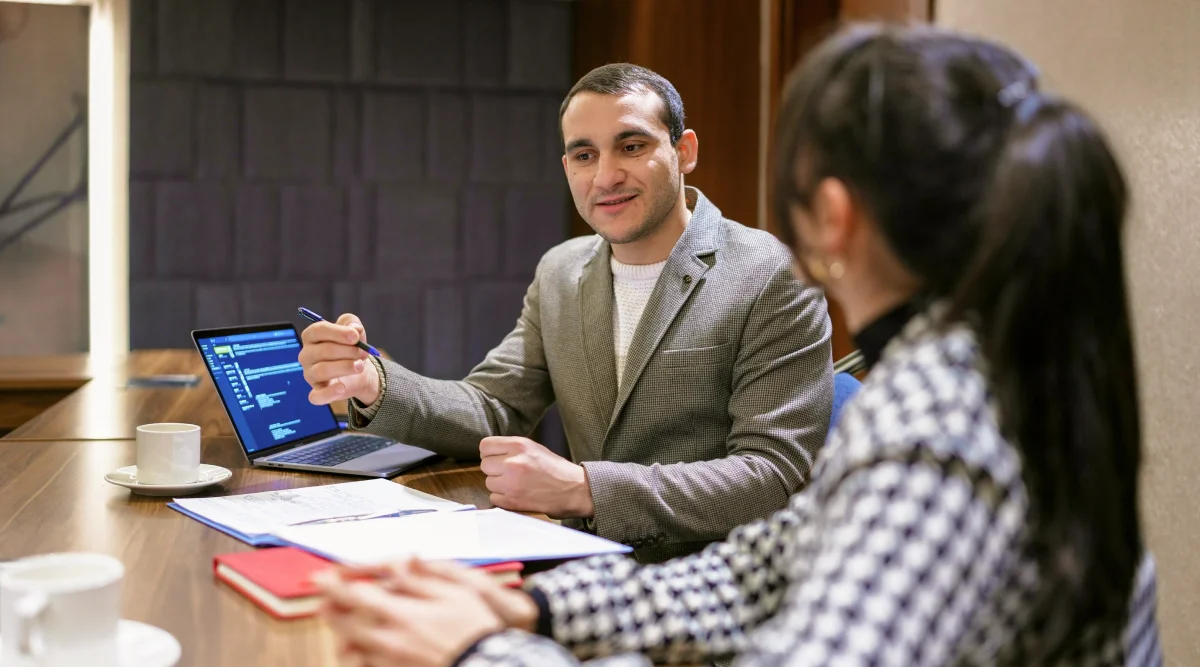If you have a eureka moment for an invention, and you're serious about selling that invention, you need to protect it by finding an expert in patent law. After all, the last thing you want is for somebody else to get rich off of your idea—or to wind up in an infringement process, where you’re filing against a defendant who you believe stole your concept, or where somebody else sues claiming you stole their invention.
The infringement process can be time-consuming, expensive, and stressful. This is why it’s important to talk to a patent lawyer when you have an amazing idea for an invention and are ready to show it to the world. The right patent attorneys can help your creation become the next big thing without any courtroom drama.

Top 9 questions to ask a patent lawyer
Looking to hire a patent lawyer? Do your due diligence to ensure you're working with the right patent attorney, one who has experience as a patent attorney and has good technical insight into the work your company is doing.
Here are questions you should ask before you hire someone.
1. What is your technical background or experience with patents in my industry?
Even if your gadget is technically simple, it may be hard to find the right patent attorney. Ask questions to see if the lawyer has personal experience with the kind of patent applications you need to write and the products you want to protect. They should also be able to help you describe the invention in a way that protects its value. You want someone who understands how to take your idea and turn it into valuable intellectual property.
For example, say you invent a new dog toy. Many other patents describe similar dog toys, but your toy is shaped in a way that will tire dogs quickly when they shake it. You will want a patent lawyer with some understanding of dogs, how they play, and why people want to buy toys for them. Ideally, you want a lawyer with experience writing patents for pet toys.
You can also ask about the type of work they've done in the past; how many years of experience they have; and, if a new attorney, did they have experience partnering with an experienced patent attorney to learn how to write patent applications. Patent lawyers write a lot of patents, and not all of them are in the field they have the most education in.
2. How do you work with your clients?
Writing a patent with a lawyer is a collaborative process. Like any collaborative process, it requires communication. What is the lawyer's patent process? How often do they meet with their clients? Perhaps you want a lawyer who will take your notes and draft a patent application for your review. Or maybe you are more comfortable with the lawyer reviewing your notes and coming up with a strategy for your approval before writing the bulk of the specifications.
The patent lawyer works for you. You are hiring them to manage a complex project that may involve a lot of people. You need a lawyer who can manage writing the patent and be a technical and legal expert. And you want to find out early if you and the attorney share the same ideas and processes.
3. What kind of team do you have?
Filing a patent is a complex process, and your lawyer will lead a team of professionals. It's most likely that your lawyer will have junior patent attorneys or patent agents who work for them. Ask who will work on your patent and why they chose them.
Most lawyers hire drafting technicians to make patent drawings. Ask how long it will take to make the drawings and how you will work with their team to sketch and approve them.
You also need to know the lawyer's paraprofessional support staff. Who will file your patent application, and who will keep track of the responses made by the U.S. Patent Office?
Do not overlook your contributions. You are the expert on your invention. Do you want to draft some of the application yourself? Do you have some drawings you think are perfect? Know what part you want to play on the team and hire a lawyer you can work with.
4. Can you provide a breakdown of your rates?
There are many different types of patent work that patent attorneys do. Knowing what fees one charges for their services allows you to comparison shop. You also might determine that there are certain services or additional costs you don’t need to pay for.
Asking for a breakdown of rates and fees can lead you to services you weren't aware of. For instance, you may become interested in having your patent attorney prepare and file a PCT application, which is used to apply for international patent applications in multiple countries at once. This is a service that perhaps you wouldn’t have known about until asking for a breakdown of rates.
Discussing fees may also help you get a sense of how complicated patents can be. For instance, you may want an attorney to respond whenever you receive office actions (letters from the patent office that require a written response from the applicant before the application process can continue).
You may also want to see if your lawyer will charge a flat fee for their services.
5. Have you worked as an examiner at the U.S. Patent and Trademark Office?
Law firms prize patent attorneys who have worked as examiners. They are expert negotiators who understand both sides of the table.
If a lawyer has not worked as an examiner, don't pass them over. However, if you are trying to choose between two qualified patent lawyers, you may want to hire the one who was a U.S. Patent and Trademark Office (USPTO) examiner.
For example, once your dog toy patent is filed, it will go to a technical group at the USPTO (called a Group Art Unit) that examines animal toy patents. If your lawyer worked in that office, they will have insight into how it is managed. This will guide how they write the application.
However, a former examiner turned patent lawyer won't use their relationships with the current examiners at the USPTO to give you an edge. They simply have insight into what it is like to respond to a patent application and will write your patent accordingly.
6. How do you determine if an invention is patentable?
It’s a question worth asking, partially to get a sense of how much the patent attorney knows about patent law.
After all, not all inventions are going to get through the patent application process, also known as patent prosecution. As the International Trade Administration states, utility patents—the most common type of patent—are granted when an invention is “new, non-obvious, and useful.”
That can be subjective, and every inventor always thinks their invention is new, non-obvious, useful, and deserving of a granted patent that will allow them the right to stop others from manufacturing their product. Experienced patent attorneys will know if that’s the case for your invention.
7. What kind of patent search will you conduct, and how comprehensive is it?
You want to know what your patent attorney will do—and if their search is likely to yield results.
Obviously, you’re hoping to discover that there is no patent resembling your invention—but if there is one, you want to find it so you don’t have a problem later with an infringement process. If competitors are infringing on your ability to make money off your invention, and they can do it without legal recourse on your part, it'll be a setback from which you may not easily recover.
8. What are the potential risks involved in the patent process, and how can we mitigate them?
You want to make sure your patent attorney is well aware of problems that could crop up—and to know there’s a plan for navigating any peril.
Here are a few examples of the types of scenarios that could occur:
- It’s determined you don’t own the rights to your invention. If that happens, competitors could recreate your invention and steal your customers. This is where having a patent attorney help you with your patent application—and getting your invention off to the right start—can pay off.
- Your company’s value could be reduced. If you wanted to sell your company, it's going to be much harder if your right to license your product is deemed invalid and competitors are now using your product, manufacturing what only you initially could.
- Liability for damages. If your patent is determined invalid, other inventors could bring litigation against you if they can prove your patent kept their patent from being accepted—and if, thanks to your invalid patent, you kept them from generating profits.
You want to be confident that your patent attorney knows the risks of bungling your application. They should have experience representing clients in navigating the choppy waters of getting an invention off the ground and into the marketplace successfully.
9. Do you recommend I pursue international patent protection?
American patents offer protection within the United States’ borders. There isn't an international patent that is enforceable in more than one country. Some patents (like PCT or EP) act as hubs to branch out into multiple countries from one application, but each country is its own office.
How to find a patent attorney
There are many patent attorneys, but you want to find one who has a registration with the USPTO. You want someone you can work well with, who understands your industry and product, especially if it involves a lot of complicated technology.
If you’re looking for tips on how to find a patent attorney, you may want to try the following.
Ask for recommendations
Other industry professionals have likely worked with patent attorneys. Maybe you have a contact who has worked with patent attorneys that you should be working with, too. If they've had a good experience and positive outcome, there's a better chance you will, too.
Look for patent attorneys near you
With video conferencing technology, you can work with an attorney and their practice anywhere. If you prefer to have one-on-one meetings, you could search through a local law firm for patent attorneys in your area.
Use the USPTO Patent Practitioner directory
The Patent Practitioner directory can be an excellent way to find registered patent attorneys who are authorized to practice and represent clients before the United States Patent and Trademark Office (USPTO).
Search LegalZoom’s online attorney directory
The easiest way to find a good patent attorney is through an online directory, such as LegalZoom’s.
Simply type in your state and the type of law you’re interested in. You'll then see pictures of attorneys along with their biographies and relevant information. There also may be customer reviews you can peruse.
Directories such as this one can also be helpful since they'll offer patent attorneys and not patent agents. Patent agents know a lot about shepherding an invention from an idea to getting it to the marketplace, but they aren't attorneys and can't offer patent law advice.
FAQs
Why should I hire a patent attorney?
The process of filing a patent is complex, and the consequences of making a mistake are significant. By having your application filled out properly, you're less likely to have your application denied due to a technicality. You're more protected against a lawsuit, and you gain the benefit of having an expert review your documentation before you apply.
What is the difference between a patent agent and a patent attorney?
A good patent agent is very capable and has a deep bench of knowledge. What patent agents can't do is offer legal advice. A patent attorney can help you as you file your patent application, respond to patent office communications, and offer legal advice as you move forward or respond to legal matters.
That's much of the value of hiring a patent attorney over agents: They know the ins and outs of patent law and can protect you as you navigate the process. As you would expect, generally, attorneys charge higher fees than agents.
What is the main purpose of a patent attorney?
A patent attorney's main purpose is to provide legal services that keep you and your patent on the right side of the law. Patent law is very complex, and a good patent attorney understands patent matters, patent rights, and intellectual property rights. They also understand the technical aspects of having a proper patent, such as filing internationally and how the United States Patent and Trademark Office (USPTO) works. They should also have a registration with the USPTO.
What should I ask a patent attorney?
When you first meet with an attorney, ask a lot of questions to get information, such as how many patents they have worked on and what sort of patent cases they have been involved with. Find out what sort of technical experience they have and whether they have worked with getting inventions into the marketplace in other countries. Ask what their success rate is with cases similar to yours.
Most patent attorneys will be happy to field your queries. Asking a lot of questions in that initial consultation is one of the best ways of understanding your patent attorney's qualifications and if they're going to be able to help you with important steps in the patent process, such as the patent prosecution (the period referring to when inventors are filling out patent applications).


